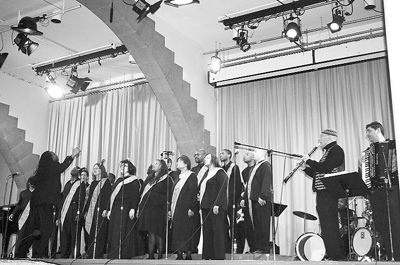A post-election concert celebrating gay and Jewish life
The Great Hall at Cooper Union was the site of a unique musical experience on Sunday, December 5, when the Lavender Light Gospel Choir, a gay and lesbian singing group, and the West End Klezmorim, a traditional Jewish folk music troupe, presented “Uniting Traditions,” a concert meant to combine the two musical traditions of communities accustomed to striving for equality. The event was the brainchild of Assemblywoman Deborah Glick, a Manhattan Democrat, who is a lesbian, who said that this year’s bitterly fought presidential contest and Republican victories had upset constituents in her overwhelmingly Democratic district. “When it was clear that this election had been about dividing people, the opportunity provided itself to have a concert,” said Glick, as the audience filed into their seats. With the speeches over and the ballots cast, Glick’s intention was to gather two of the groups who comprise a large percentage of her district, LGBT and Jewish voters, including many senior citizens, for a cultural celebration. “And the arts are a way of healing the rancor and overcoming the divisiveness,” added Glick. The lawmaker stood before a stage crowded with microphones and musical equipment, an iconic site for American progressivism ever since Frederick Douglass and Abraham Lincoln delivered 19th century anti-slavery speeches.
The mood on December 5 was decidedly less revolutionary, if not relaxed, with the actor Liev Schreiber, star of “The Manchurian Candidate,” introducing the West End Klezmorim, led by composer and clarinetist, Harold Seletsky. Schreiber said that he has become well acquainted with klezmer, the East European folk music, since undertaking research about an upcoming movie set in Ukraine. “The music starts with, ‘Oy, vey, we are all going to die,’ and then goes into this rapturous dance that is very strange, mystical and beautiful,” said Schreiber.
Seletsky opened with “Spiritual Fantasy,” a mournful, blues-like clarinet solo that gently morphed into just what Schreiber described, an up-tempo folk polka with accordion, drum and electric guitar accompaniment, reminiscent of a schtetl celebration from “Fiddler on the Roof.”
Seletsky explained that the “frailach,” a central construction in klezmer, has been a generational mainstay, still played at Jewish weddings, that “invites—no, compels— movement.” Seletsky added that the 1940s musical great, Benny Goodman, adapted popular1920s frailachs into mainstream popular numbers, such as “The Angels Sing.”
Following the performance of Seletsky’s troupe, the Lavender Light Gospel Choir, a multi-racial group of gays and lesbians, led by Ray Gordon, artistic director and pianist, opened with the rousing, “Lord, Help Me to Hold Out,” with baritone Max Rodriguez leading. Other numbers included “Shower Me With Blessings” and “Shelter in Time of Storm.”
The choir’s choice of songs underscored the group’s mission of keeping black gospel music alive, especially for the gay and lesbian community.
The West End Klezmorim and Lavender Light then engaged in some collaborative numbers, for which the singers and musicians had rehearsed for some time. The gospel singing, cut through with signature riffs on Seletsky’s clarinet, lent to an enthusiastic audience swaying in their seats and clapping along, compelled to move.
At the end, with a house full of Jews, gays and lesbians, some accompanied by their children, Glick seemed to have united a multi-generational, -racial and -cultural assortment of New Yorkers for a pleasant musical afternoon.
—Mick Meenan


































